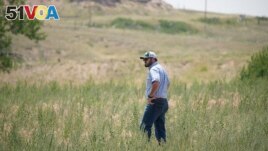15 March 2022
Lawmakers in the American state of Colorado are looking for easy and effective ways to save water.
"There's not any more water out there and what water is out there is becoming really expensive. So, let's look at how we're using it now," said John Berggren. He is a water policy expert with Western Resource Advocates, a non-profit group.
Berggren's organization supports an effort by Colorado's lawmakers to launch a statewide turf replacement program. Turf is land covered with grass. The program aims to pay home and business owners to replace their grass with other plants and landscapes for the state's dry climate.

Cole Gustafson, a water resource administrator for the city of Greeley walks in a meadow to find a well head on the Terry Bison Ranch near Carr, Colorado. (AP Photo/David Zalubowski)
The legislation would be a way to deal with demand for the state's water, said Colorado state representative Marc Catlin. He spoke at a committee meeting in February. Catlin added that the replacement would be completely voluntary.
Supporters say similar programs across the west have saved billions of liters of water. Property owners have been paid from a few cents to a few dollars for every square meter of turf they replace.
About 19 Colorado cities, water services and water districts already have turf replacement programs. The legislation would offer the same amount of money for those programs.
The bill would also help local governments launch programs of their own. People who live in areas without such a program could make a request directly to the state for money.
Zane Marshall is director of resources and buildings for the Southern Nevada Water Authority. He said that some grassy places, like parks and sports fields, are functional. That means they serve a purpose.
Turf replacement programs, like the one in the Las Vegas Valley, center on lawns meant to look nice.
Marshall said that in Las Vegas one tenth of a square meter of grass can use 276 liters of water every year. Replacing that grass with native plants and landscaping can cut that to 82 liters or less.
The Las Vegas Valley has always been dry. The desert area averages 10.7 centimeters of rainfall a year. The people who live there take 90 percent of their water from the Colorado River. The rest comes from an underground water source in the area.
Water officials launched the area's Water Smart Landscapes Rebate program in 1999, Marshall said. The program offered residents $4 for every square meter of lawn that they replaced.
Valley residents, apartment managers and business owners took the government's money and replaced their grasses with rocks, Nevada agave and desert marigolds. Water officials increased the offer to $10 for each square meter in 2003, then $20 in 2007. Now water officials offer $30 for each square meter up to 929 square meters, Marshall said.
Property owners in the Las Vegas Valley have removed more than 18.5 million square meters of turf, Marshall said. That has saved about 741 billion liters of water since the program started, he added.
In Colorado, the city of Greeley's turf replacement program, called Life after Lawn, is younger but still successful, said Water Conservation Manager Dena Egenhoff. Since launching in 2018, the program has helped property owners save an estimated 145 million liters of water.
"They lower their water bills, and they can still have a beautiful landscape no matter what climate conditions are now or in the future," she said.
The turf replacement program in Castle Rock has also saved millions of liters. The city has reduced residential water use by 7 percent since starting its replacement program in 2009, said water efficiency supervisor Rick Schultz. Non-residential properties became able to get government money in 2019. Since then, water use has been reduced by about 29 percent, Schultz said.
Representatives of the Colorado Water Conservation Board, the Colorado Cattlemen's Association and the Colorado River District support the state bill.
If the measure becomes law, the Colorado Water Conservation Board would have to develop a statewide turf replacement program by July 2023.
I'm Jonathan Evans.
Conrad Swanson reported on this story for the Associated Press. Jonathan Evans adapted this story for Learning English.
____________________________________________________________________
Words in This Story
expensive –adj. costing a lot of money
landscape –n. an area of land that has a particular quality or appearance; an area of land around a house that has been designed to look appealing
resident –n. a person who lives in a particular place